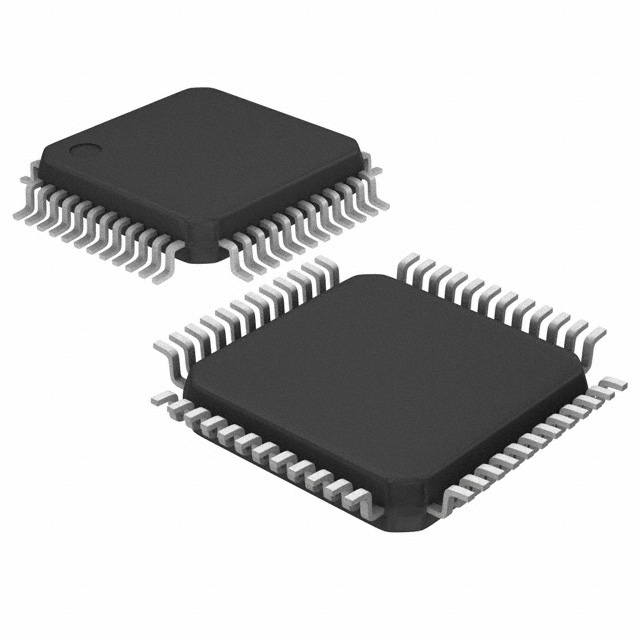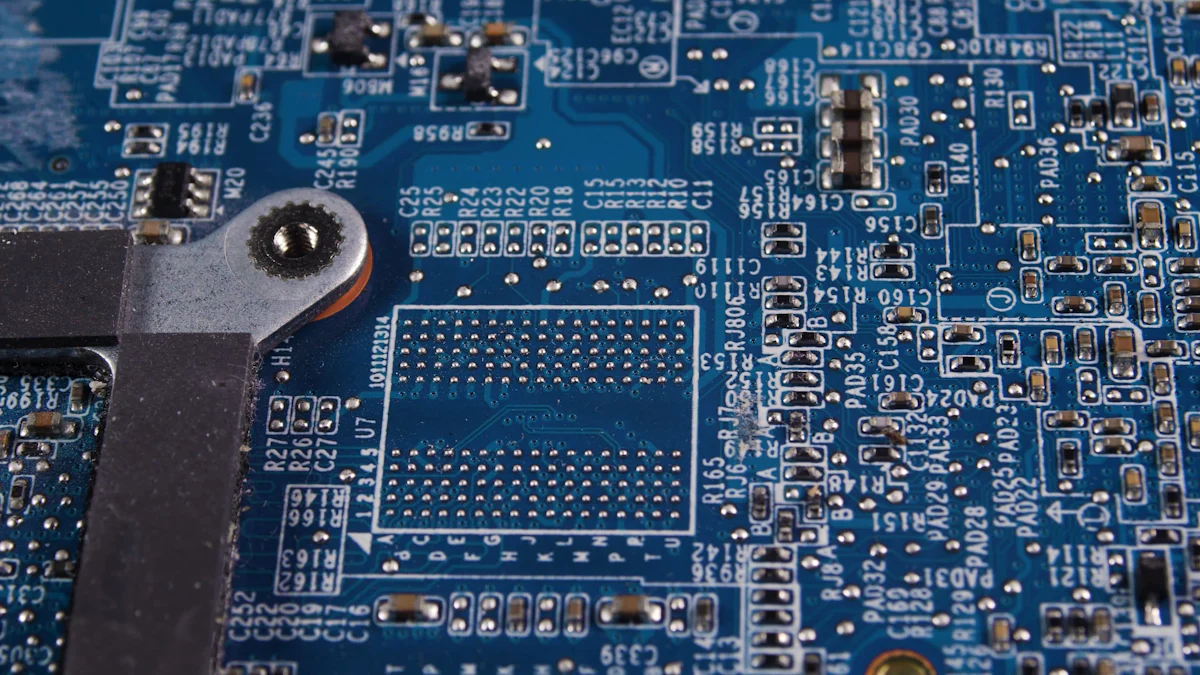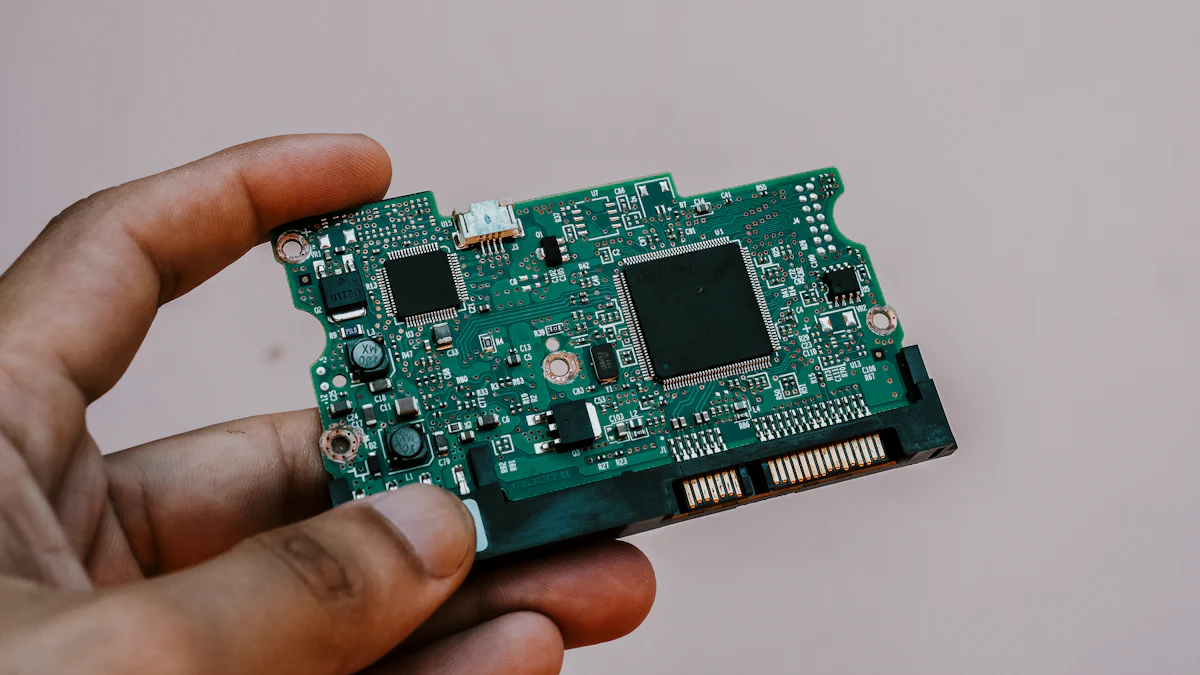LPC2103FBD48: Your Microcontroller Solution

The LPC2103FBD48, crafted by NXP, is a leading option among Low Power Microcontrollers. Its low power consumption and efficiency make it perfect for contemporary embedded systems. This microcontroller features on-chip peripherals that facilitate seamless communication and control, enhancing its adaptability. Designed for applications where energy efficiency is paramount, such as battery-operated devices, the LPC2103FBD48's compact size and robust performance ensure it meets the demands of today's technology-driven world. For more detailed specifications, you can refer to this datasheet.
Key Features of LPC2103FBD48
The LPC2103FBD48 microcontroller, developed by NXP, stands out in the realm of Low Power Microcontrollers due to its impressive features. Understanding these features will help you appreciate why this microcontroller is a preferred choice for many embedded applications.
Processing Power
The LPC2103FBD48 boasts a robust processing capability, thanks to its ARM7TDMI-S core. This core supports both 16-bit and 32-bit instruction sets, providing flexibility in programming. Operating at a frequency of up to 70MHz, it ensures that your applications run smoothly and efficiently. The unique accelerator architecture enhances performance, especially in critical tasks like interrupt service routines and DSP algorithms. This means you can expect up to a 30% performance boost over the Thumb mode, making it ideal for demanding applications.
Memory Capacity
Memory is a crucial aspect of any microcontroller, and the LPC2103FBD48 does not disappoint. It comes with 32kB of high-speed flash memory for program storage, ensuring quick access and execution of your code. Additionally, it includes 8kB of SRAM, providing ample space for data storage. This combination of flash memory and SRAM allows you to develop complex applications without worrying about memory constraints.
Integrated Peripherals
The LPC2103FBD48 excels in connectivity and control with its integrated peripherals. It features multiple serial communication interfaces, including UARTs, SPI, SSP, and two I2C-buses. These interfaces enable seamless communication with other devices, making it versatile for various applications. The inclusion of a low-power real-time clock (RTC) and a vectored interrupt controller further enhances its functionality, allowing you to manage time-sensitive tasks efficiently.
Benefits of Using LPC2103FBD48
Choosing the right microcontroller can significantly impact the efficiency and cost-effectiveness of your projects. The LPC2103FBD48 from NXP offers several benefits that make it a standout choice among Low Power Microcontrollers.
Low Power Consumption
The LPC2103FBD48 excels in low power consumption, making it ideal for battery-operated devices. Its design leverages CMOS technology, which is known for its energy efficiency. This microcontroller operates efficiently even at a high clock speed of 70MHz, ensuring that your applications run smoothly without draining power quickly. By choosing the LPC2103FBD48, you can extend the battery life of your devices, which is crucial for portable electronics and IoT applications.
Cost-Effectiveness
Cost is always a consideration in any project. The LPC2103FBD48 offers a cost-effective solution without compromising on performance. Its integration of on-chip peripherals reduces the need for additional components, which can lower the overall cost of your design. Additionally, its flexible programmability options allow you to tailor the microcontroller to your specific needs, potentially saving on development costs. This balance of affordability and functionality makes it a smart choice for budget-conscious developers.
Reliability
Reliability is paramount in embedded systems, and the LPC2103FBD48 delivers on this front. Its robust architecture ensures consistent performance across various applications. The microcontroller's 32-bit RISC architecture provides a stable platform for executing complex tasks reliably. Furthermore, the inclusion of a vectored interrupt controller enhances its ability to handle time-sensitive operations, ensuring that your applications remain responsive and dependable. With the LPC2103FBD48, you can trust that your systems will perform reliably under different conditions.
Applications of LPC2103FBD48

The LPC2103FBD48 microcontroller, developed by NXP, finds its place in a variety of applications due to its efficiency and versatility. Its design caters to the needs of modern technology, making it a preferred choice for many developers.
IoT Devices
In the realm of IoT devices, the LPC2103FBD48 shines with its low power consumption and robust processing capabilities. You can rely on this microcontroller to handle the demands of IoT applications, where energy efficiency is crucial. Its 32-bit architecture and high clock speed ensure that your IoT devices perform efficiently, even when processing complex data. The integrated peripherals facilitate seamless communication with other devices, making it an ideal choice for smart home systems, wearable technology, and connected appliances.
Portable Electronics
For portable electronics, the LPC2103FBD48 offers a compact and efficient solution. Its small size and low power requirements make it perfect for devices that need to be lightweight and battery-operated. You can use this microcontroller in applications like digital cameras, handheld gaming consoles, and portable medical devices. The flash memory and SRAM provide ample storage for your applications, ensuring quick access and execution of tasks. With the LPC2103FBD48, you can create portable electronics that are both powerful and energy-efficient.
Battery-Operated Devices
Battery-operated devices benefit greatly from the LPC2103FBD48's low power consumption. You can extend the battery life of your devices by choosing this microcontroller, which is essential for applications like remote sensors, wireless communication devices, and GPS trackers. Its efficient power usage allows your devices to operate longer without frequent recharging or battery replacement. The real-time clock and vectored interrupt controller enhance its functionality, enabling precise time management and responsive performance in battery-operated systems.
Technical Specifications of LPC2103FBD48
Understanding the technical specifications of the LPC2103FBD48 helps you appreciate its capabilities and decide if it fits your project needs. This microcontroller, developed by NXP, stands out among Low Power Microcontrollers due to its efficient design and robust features.
Power Ratings
The LPC2103FBD48 operates with a power supply voltage range of 3.0V to 3.6V. This range ensures that your device can function efficiently while maintaining low power consumption. The microcontroller's design focuses on minimizing energy usage, making it ideal for battery-operated devices. You can rely on its power efficiency to extend the operational life of your applications, which is crucial for portable and IoT devices.
Processing Speed
With a maximum operating frequency of 70 MHz, the LPC2103FBD48 provides ample processing speed for a variety of applications. This speed allows you to execute complex tasks swiftly, ensuring that your systems remain responsive and efficient. The ARM7TDMI-S core enhances performance by supporting both 16-bit and 32-bit instruction sets, offering flexibility in programming. You can expect smooth operation even in demanding environments, thanks to its robust processing capabilities.
Connectivity Options
The LPC2103FBD48 excels in connectivity, featuring multiple interfaces that facilitate seamless communication with other devices. It includes two UARTs, SPI, SSP, and two I2C-buses, providing versatile options for data exchange. These interfaces enable you to integrate the microcontroller into various systems, enhancing its adaptability. Whether you're working on smart home devices or portable electronics, the LPC2103FBD48's connectivity options ensure that your applications can communicate effectively with other components.
Comparison with Other Low Power Microcontrollers

When choosing a microcontroller, you should consider how the LPC2103FBD48 from NXP compares to other low power microcontrollers. This comparison will help you understand its strengths and decide if it fits your project needs.
Power Efficiency
You will find that the LPC2103FBD48 excels in power efficiency. Its design focuses on minimizing energy consumption, making it ideal for battery-operated devices. Unlike some other microcontrollers, it operates efficiently even at high clock speeds. This efficiency ensures that your devices can run longer on a single charge, which is crucial for portable electronics and IoT applications. By choosing the LPC2103FBD48, you can extend the battery life of your products, reducing the need for frequent recharging.
Performance Metrics
In terms of performance, the LPC2103FBD48 stands out with its ARM7TDMI-S core. This core supports both 16-bit and 32-bit instruction sets, providing flexibility in programming. Operating at a frequency of up to 70MHz, it ensures smooth and efficient application performance. Compared to other low power microcontrollers, the LPC2103FBD48 offers a unique accelerator architecture that boosts performance, especially in critical tasks like interrupt service routines. This feature makes it a strong contender for demanding applications where performance cannot be compromised.
Unique Selling Points
The LPC2103FBD48 offers several unique selling points that set it apart from other microcontrollers. Its compact size and robust performance make it suitable for applications requiring miniaturization. The inclusion of integrated peripherals, such as multiple serial communication interfaces and a low-power real-time clock, enhances its versatility. These features allow you to develop complex applications without needing additional components. Additionally, its cost-effectiveness and reliability make it an attractive choice for developers looking to balance performance and budget.
The LPC2103FBD48 microcontroller offers a compelling blend of features and benefits that make it an excellent choice for various embedded applications. Its robust processing power, ample memory capacity, and integrated peripherals ensure high performance and versatility. You will find its low power consumption particularly advantageous for battery-operated devices, extending their operational life. The microcontroller's compact size makes it ideal for applications requiring miniaturization. By choosing the LPC2103FBD48, you gain a reliable and cost-effective solution that stands out in the competitive market of low power microcontrollers.
See Also
The Importance of CP2108-B02-GMR Silicon Today
Essential Insights on CP2104-F03-GMR for Embedded Systems
Utilizing the HD6477043F28 Microcontroller in Your Projects
Exploring XC2C128-7VQG100I Programmable Logic in Embedded Systems
Efficient Power Solutions for Embedded Systems with MC68LC060RC50

